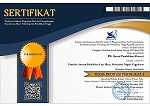A Systemic Literature Review: Educational Programming Models For Gifted Students in Indonesia
Downloads
Downloads
Abdillah. (2015). The implementation of gifted education through acceleration program at senior Islamic high school (MAN) 1 Medan North Sumatera. IOSR Journal of Humanities and Social Science, 20 (1). pp. 40-50. ISSN 2279-0837.
Anaguna, N., Suhendra, & Rahmadani. (2019). Tracking down gifted students' creative thinking in solving mathematics problems. Journal of Physics: Conference Series. 1211. 012059. http://dx.doi.org/10.1088/1742-6596/1211/1/012059
Clark, Barbara. (2012). Growing up gifted: developing the potential of children at school and at home, 8th edition. USA: Pearson.
Davis, G.A., Rimm, S. B., & Siegle, D. (2014). Education of the gifted and talented (6th ed.). Boston, MA: Pearson.
Dewi, Anita. (2017). Acceleration provisions for academically gifted and talented junior secondary school students in Indonesia. Master's thesis. New Zealand: The University of Auckland.
Dimyati, Surachman, & Said, Asnah. (2014). How to Teach Science for Elementary Gifted Students. a Case Study Done at Cgs Cianjur in Indonesia. 2nd International Conference on Education and Language 2014, Bandar Lampung, Indonesia, May 2014. Bandar Lampung University.
Eva, N., Tairas, MMW., & Alsa, A. (2022). Gifted students' achievement in Natural Sciences: a modeling study. Journal of Gifted Education and Creativity, 9(2), 203-218.
Fakhruddiana, F. & Ardiyanti, D. (2022). Studi Komparatif Sekolah Khusus Anak Gifted/ Berbakat di Indonesia dan di Malaysia. Jurnal Riset Psikologi (JRP), 2(2), 131-140. https://doi.org/10.29313/jrp.v2i2.1603
Hallahan, D.P. & Kauffman, J.M. (2006). Exceptional learners: introduction to special education 10th ed. USA: Pearson.
Hart, C. (2018). Doing a literature review: releasing the research imagination. London. SAGE.
Hartati, S., Purnama, S., Heriati, T., Palupi, E, K., Kasayanond, A., & Roslina, R. (2019). Empowerment Gifted Young Scientists (GYS) in Millennial Generation: Impact of Quality Improvement in Education of Gender Perspective. Journal for the Education of Gifted Young Scientists, 7(4), 885-898. http://dx.doi.org/10.17478/jegys.621021
Indonesian Government. (2003). Undang-undang nomor 20 tahun 2003 tentang sistem pendidikan nasional. Indonesia
Kismawiyati, R. (2018). Identifikasi anak berkebutuhan khusus di sekolah PAUD Kabupaten Jember. "HELPER" Jurnal Bimbingan Dan Konseling FKIP UNIPA, 35(1). https://doi.org/10.36456/helper.vol35.no1.a1456
Liana, Y.R., Linuwih, S., & Sulhadi. (2020). Science activity for gifted young scientist: thermodynamics law experiment media based IoT. Journal for the Education of Gifted Young Scientists, 8(2), 757-770. http://dx.doi.org/10.17478/jegys.657429
Mun, R. U., Ezzani, M. D., & Yeung, G. (2021). Parent Engagement in Identifying and Serving Diverse Gifted Students: What Is the Role of Leadership?. Journal of Advanced Academics, 32(4), 533–566. https://doi.org/10.1177/1932202X211021836
Nashori, Fuat. (2016). Kebijakan pendidikan untuk anak berbakat. Buletin Psikologi UGM , 10–13. https://doi.org/10.22146/bpsi.13235 or https://jurnal.ugm.ac.id/buletinpsikologi/article/view/13235
Newman, M., Gough, D. (2020). Systematic Reviews in Educational Research: Methodology, Perspectives and Application. In: Zawacki-Richter, O., Kerres, M., Bedenlier, S., Bond, M., Buntins, K. (eds) Systematic Reviews in Educational Research. Springer VS, Wiesbaden. https://doi.org/10.1007/978-3-658-27602-7_1
Nilles, K., Jolly, J.L., Inman, T.F., & Smutny, J.F. (Eds.). (2019). Success Strategies for Parenting Gifted Kids: Expert Advice From the National Association for Gifted Children (1st ed.). Routledge. https://doi.org/10.4324/9781003238287
Ninkov, I. (2020). Education policies for gifted children within a human rights paradigm: a comparative analysis. Journal of human rights and social work, 5(4), 280–289. https://doi.org/10.1007/s41134-020-00133-1.
Ronksley-Pavia, M., & Neumann, M. M. (2020). Conceptualising Gifted Student (Dis) Engagement through the Lens of Learner (Re) Engagement. Education Sciences, 10(10), 274. http://dx.doi.org/10.3390/educsci10100274
Safura, S. (2017). An Analysis of Accelerated Classroom in Indonesia. Jurnal Dedikasi Pendidikan, 1(1), 36-44. https://doi.org/10.30601/dedikasi.v1i1.66
Semiawan, Conny, R. (1997). Perspektif pendidikan anak berbakat. Jakarta: PT Gramedia Widiasarana Indonesia.
Smedsrud, J. (2020). Explaining the Variations of Definitions in Gifted Education. Nordic Studies in Education, 40(1), 79–97. https://doi.org/10.23865/nse.v40.2129
Smith, Deborah Deutsch. (2017). Introduction to Contemporary Special Education: New Horizons, 2nd Edition. USA: Pearson
Suherman, Y., Maryanti, R., and Juhanaini, J. (2021). Teaching science courses for gifted students in inclusive school. Journal of Engineering Science and Technology, 16 (3), 2426-2438
Triandini, E., Jayanatha, S., Indrawan, A., Werla Putra, G., & Iswara, B. (2019). Metode Systematic Literature Review untuk Identifikasi Platform dan Metode Pengembangan Sistem Informasi di Indonesia. Indonesian Journal of Information Systems, 1(2), 63–77. https://doi.org/10.24002/ijis.v1i2.1916
Ulger, B.B. & í‡epni, S. (2020). Gifted education and STEM: A Thematic Review. Journal of Turkish Science Education,17(3), 443–466. Doi: 10.36681/tused.2020.38
Utami, Hidayati & Ashadi, Ashadi. (2018). Direct EFL Instruction for Gifted Students: A Case Study. CELT: A Journal of Culture, English Language Teaching & Literature. 18. 327. http://dx.doi.org/10.24167/celt.v18i2.870
Vantassel-Basca, Joyce. (2021). Talent Development in Gifted Education: Theory, Research and Practice. New York: Routledge.
Wahab, R. (2010). Model bimbingan perkembangan untuk meningkatkan kecakapan sosial-pribadi anak berbakat akademik. Jurnal Cakrawala Pendidikan, 1(3). https://doi.org/10.21831/cp.v1i3.241
Wahyuni, Ayu Sri. (2022). Literature Review: Pendekatan Berdiferensiasi Dalam Pembelajaran IPA. JURNAL PENDIDIKAN MIPA, 12(2), 118-126. https://doi.org/10.37630/jpm.v12i2.562
Winner, E. (2000). The origins and ends of giftedness. The American psychologist, 55 1, 159-69. https://doi.org/10.1037/%2F0003-066X.55.1.159















